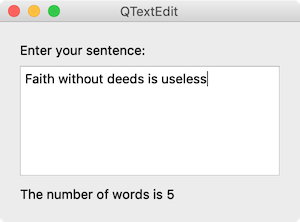QTextEdit¶
The QTextEdit class provides an editor that lets you edit and display both plain text and rich text.
Let’s use two labels and a text editor to create a simple program that displays the number of words.
Example¶
import sys
from PyQt5.QtWidgets import QApplication, QWidget, QLabel, QTextEdit, QVBoxLayout
class MyApp(QWidget):
def __init__(self):
super().__init__()
self.initUI()
def initUI(self):
self.lbl1 = QLabel('Enter your sentence:')
self.te = QTextEdit()
self.te.setAcceptRichText(False)
self.lbl2 = QLabel('The number of words is 0')
self.te.textChanged.connect(self.text_changed)
vbox = QVBoxLayout()
vbox.addWidget(self.lbl1)
vbox.addWidget(self.te)
vbox.addWidget(self.lbl2)
vbox.addStretch()
self.setLayout(vbox)
self.setWindowTitle('QTextEdit')
self.setGeometry(300, 300, 300, 200)
self.show()
def text_changed(self):
text = self.te.toPlainText()
self.lbl2.setText('The number of words is ' + str(len(text.split())))
if __name__ == '__main__':
app = QApplication(sys.argv)
ex = MyApp()
sys.exit(app.exec_())
When you type text in a text editor, it displays the number of words below.
Description¶
self.lbl1 = QLabel('Enter your sentence:')
self.te = QTextEdit()
self.te.setAcceptRichText(False)
self.lbl2 = QLabel('The number of words is 0')
We used QTextEdit() class to create a text editor.
If you set setAcceptRichText as False, it perceives everything as plain text.
The label below shows the number of words.
self.te.textChanged.connect(self.text_changed)
Whenever the text in the text editor is modified, the text_changed method is called.
self.clear_btn = QPushButton('Clear')
self.clear_btn.pressed.connect(self.clear_text)
If you click clear_btn, the clear_text method is called.
vbox = QVBoxLayout()
vbox.addWidget(self.lbl1)
vbox.addWidget(self.te)
vbox.addWidget(self.lbl2)
vbox.addStretch()
self.setLayout(vbox)
Using the vertical box layout, place two labels and one text editor vertically.
def text_changed(self):
text = self.te.toPlainText()
self.lbl2.setText('The number of words is ' + str(len(text.split())))
When the text_changed method is called, use the toPlainText() method to save the text in the text variable.
split() changes the words in the string into a list form.
len(text.split()) is the number of words in the text.
Use setText() to display the number of words on the second label.
